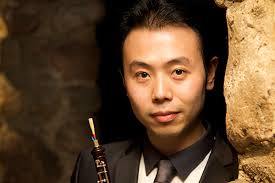When string quartets die
NewsOur diarist Anthea Kreston, violinist in the Delgani quartet (pictured) has been reflecting on the disappearace of five international string quartets, each with its own reason.
We fall in love easily with a string quartet. Dashing, energetic, wise, idealistic, sensitive, enigmatic – they bring us to magical places we haven’t been before and hold our hands as we stroll down memory lane. When they leave us, as they always do, we thank them for changing our lives, for giving everything they had to the art, and to us.
There are several reasons that a group says farewell, of which three come uppermost to mind – retirement, work/life balance, and the spectacular blow-out. Added on top, or perhaps woven through, these reasons is the pandemic – that ever-looming, ever changing behemoth, which continues to leave a complicated trail of slime in its wake.
Emerson, Orion, Auryn – these giants of the world stage have recently, gracefully retired, having shaped the legacy of string quartet playing in the 21st century – an elegant bow to a storied career. They have given all, and through their teaching have generously sprouted the next generation(s) of quartets.
The breathtaking breakups – most notably the Audubon Quartet, with its cyclone of court battles scattering personal effects far and wide like a made-for-T.V. movie – these are rare (or perhaps, with non-disclosure agreements being signed behind closed doors, not quite as rare as one might imagine).
The two reasons, above, are more understandable than the quartets who have left us more recently – the Albion, Spektral, Artemis – these groups, in their prime – why would they leave us? Why not just replace a member, even two, and continue the momentum – what would make a group just put its arms up and walk away? Could there be similarities between these groups?
The age of these quartets – neither young nor old – I would put them all at 30-50 years old – places them in a particular time in their lives. Less carefree than they were in their student years, their work/life balance is front and center. Responsibility to others, long-term plans, retirement and health – these are the issues that begin to weigh heavily at this moment.
It’s no secret that life in a string quartet is a double-edged blade. The joy you have from delving into the most rewarding repertoire on the planet (we think) is equaled to the clashing of egos, the struggle of four strong-willed members who all have different needs and desires. Huge time commitments, irregular travel schedules, and therefore the difficulty of maintaining a home life make quartet existence challenging. This life can mean spending more time with your colleagues than with your family. The old adage says that a string quartet is a marriage between 4 people . No matter which way you slice it, it’s a wriggling, complex beast. But, if tamed, the world opens before you.
In my case, choosing a quartet (Delgani String Quartet) which was close to family, which has a regular schedule, and has a solid concert calendar which requires no hotels or flights, made the whole quartet life-style possible.
Added to all of the above is Covid. Did your priorities change during Covid? Your job? Life before Covid in a quartet already took so much effort – and now – to rebuild the connections, to re-establish your life before? What about health insurance, retirement, long-term care?
A report from LinkedIn details how employees are now thinking differently about career planning, asking themselves fundamental questions about the jobs they do, where they work and why. LinkedIn is calling this the Great Reshuffle: a time when everyone is rethinking everything. According to Forbes, 1 in 4 workers are planning (because of Covid re-prioritization) on switching jobs in the near future. Covid gave all of us time to reflect and re-think our lives. For many, health (both mental and physical) has become dramatically more important – how does this affect your work decisions?
The last question – why not replace a member or two – why do all 4 give up? The rebuilding process can be daunting, made so much more difficult, complex and expensive because of the pandemic, perhaps they saw the reasoning of the departing member(s), perhaps they simply thought, “that was a good run! Now, on to the next challenge.”
Whatever the reasons, the commitment these groups showed, their passion and determination – that is a testament to the love we all share for this art form, the String Quartet, the most magical beast of them all. And we thank them for every minute they gave us.







One famous quartet never spoke to each other.
Unless rehearsing music.
Yet they were heartbroken when the cellist passed away…
I’d be interested to know which quartet that was, Henry!
– regards, Greg
It may of been the Beethoven string quartet.
A musician friend told me about this.
I would like to know myself
…If it’s the quartet I’m thinking of, they had familial (by marriage) connections as well
Can’t be sustainable.
Indeed….but you would be surprised at how many arguments can arise between 4 people – the combination of 2 against 2 – that is 5 possibilities – and combination of 3 against 1 is 4 possibilities. I often found that trio playing was so much simpler in this regard – always a natural tie breaker….
This is, unfortunately, not as uncommon as one might thing. For a spell, in any case.
I’ve never been in a quartet of any caliber, but Anthea Kreston certainly touches on issues that even the most amateur/just-for-fun quartet can relate to. The odd tantrums over an eighth rest, the potential clashes of fundamentally different styles where SOMEBODY has to give in for the thing to to work, the wonderful feeling when things go just right even without discussion. You just hope the wonderful moments drown out the sour ones, but the tensions are hard-wired into the situation.
At one time here in Milwaukee we had a chamber music series, in a beautiful hall, where we regularly heard the best quartets (and other chamber musicians) on a regular basis, and that was in addition to the fact that the Fine Arts Quartet was in residence at the time and its chamber music institute brought in youthful quartets that gave lots of free concerts. All gone now — other than a brief return of the FAQ now and again, I cannot recall the last time a string quartet, much less a major one, had a concert here in Milwaukee.
It was the Artist Series at the Pabst [Theater] and I assume we were on a circuit of some sort for groups on tour. It didn’t die due to a dwindling audience; sometimes a concert had to be delayed while chairs were placed on stage for the overflow. It died because the person who took over the hall had his own tastes in music, and the person he put in charge of programming told us at the last concert, in between swigs from his water bottle — and this is nearly an exact quote — that he didn’t like seeing so many older people in the seats. That was a collective gasp to remember.
I have reason to believe that many universities and colleges have also axed the old subsidized concert series’ for students that towns people also benefited from (thanks to the taxpayers I paid $2 to see the Smetana Quartet and that was “list price”).
My point — I’m getting to it — is that there was a sort of golden age for string quartets and string quartet audiences that now seems quickly over, at least where I live. Perhaps, as Debussy said of the music of Wagner, it was a twilight mistaken for a dawn.
David – I had the opportunity to play some concerts with the FAQ – I played second viola. What an amazing sound they produce – silky, unashamedly romantic in the classics. It was a time I cherish. We were all sad (I am a mid-westerner) to see that series go.
We have just lived through the golden age of String Quartet playing. String Quartets are a lot cheaper to form than orchestras. Somehow, whether it’s string quartets or others, I think a new golden age of chamber music is just beginning.
I agree, Evan! So many great quartets out there, each with an individual voice. I had the opportunity recently to sit on the juries for Borciani, Fischoff and ARD International Quartet Competitions. The halls were filled every day – 37 concerts over 11 days at ARD and every concert was a miracle.
I still vividly remember the last performance of your quartet with you, and that blistering Britten second!
Grüße aus Berlin!
RW – if I remember correctly, the Britten was your special request! Hope all is well for you and yours and Happy New Year!
Indeed it was my request along with many others that could not be realized when you broke up! All best from me and mine!
Very florid and gently whitewashing, as is common for Ms Kreston’s musings. It’s no surprise that even in great quartets, people start to dislike each other after a while, and for many, many quartets which don’t have very strong careers financially and opportunity wise, the sad truth of working together for meagre fees when split among many, coupled with many weeks on the road, exhaustion, career worries and instability, and the inevitable interpersonal squabbles, this all takes its toll. Another ugly truth is that many players start playing quartets professionally, especially in America, when they’re nowhere near the musical maturity to be great artists, and most active quartets, with a few exceptions, reflect this exactly. To summarize, hypothetically string quartet life is one thing and empirically, quite another. This is no big secret.
Indeed – another way of putting it, I suppose. I feel so fortunate to have had a great run in my quartet in my 20’s (Avalon – studied with Emerson, Cleveland and Vermeer), and later with Artemis (Berlin) and now with Delgani (Oregon). Each so different – yes difficult at times – but worth every moment.
Perhaps if the four “strong willed individuals” agree to subordinate their personal “needs and desires” to serving the interest of the music and the composer’s intentions and agree to approach musical decisions dispassionately rather than through their own “strong will” and “ego”, personal conflict can be minimized. Those with “ego” and “will” to be on top should find an area of the field requiring less collaboration.
Yes – this is the big decision – quartet life, orchestra life, teaching life – all with their own unique challenges and rewards.
Norman, how about a posting on the legendary Hollywood String Quartet? Leonard Slatkin today posted his late brother Fred Zlotkin’s memoir of them and growing up with his mother Eleanor and father Felix and the virtuosos from both sides of the family.
“The last question – why not replace a member or two – why do all 4 give up?”
Playing in a string quartet at a professional level is really a special thing. It require much hard works and commitments from all 4 players. When Pro quartet replace new player, the whole group just never feels the same. Not because the new player is incompetence or bad player. They just simply sound different with new player/s.
I am a cellist in a string quartet in Germany and when you found musicians that wants the same thing, open to suggestions, have the musicality and the time to study understand the score, investing lots of time to rehearsing and practicing while joggling between family life in their 30s and 40s. These factors narrow down to musicians’ desire to invest time to play. Money income is also a factor too. In 20s, many musicians can afford time, money just doesn’t prioritize. And if you think about how musicians job compare to other non music relatives job. Unless you play or resident with an institute, quite often there are no retirement found for most freelance musicians or Soloists. But, this is another topic.
I quite often think, when or if I couldn’t play with my current string quartet anymore, I would not want to continue or start another group. Over time, you learn to build from each other’s sounds and being in love each time when you play music. Endurance and patience will develop if all 4 players strive for a higher level of music making. It is a journey.
Chenni – sounds like you are in the point of your life where these work/life issues really come to the fore. I wish you all the luck juggling these – it seems as if you are finding a way through the difficulties and finding the joy in the quartet! Good for you!
With a booming growth of the world population and the historically ever small number of “white” string quarters, the number of climbing and fading quarters is no surprise. It is after all an art and a individual commercial profession.
Personally I regret that the south-korean all- women Esmé Quartet, begin thirty, is not listed.
Waaay too many quartets out there and also many that are not that good. Members are too young to offer audiences insight into late Beethoven repertoire! Not enough conservatories and universities to take in quartets as artists in residence. Bright tone can predominate in Quartet sound these days. Result of non western players. A sad landscape when contemporary classical angst music displaces quality quartets on presenter’s stages.